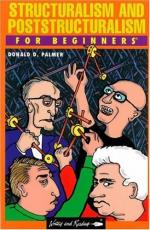|
This section contains 5,279 words (approx. 18 pages at 300 words per page) |

|
Structuralism emerged as a dominant intellectual paradigm in France in the late 1950s in part in response to the existentialist emphasis on subjectivity and individual autonomy—personified in the work and person of Jean-Paul Sartre—and in part as a reflection of the rising influence of research in the human sciences. In fact, structuralism has its origins in the work of the Swiss linguist Ferdinand de Saussure (1857–1913), whose 1906–1911 lectures at the University of Geneva, published on the basis of student notes in 1916 as the Cours de linguistique générale, provide structuralism's basic methodological insights and terminology. While Saussure's Cours makes frequent reference to a science that will study language as a system, it was the Russian-born linguist Roman Jakobson (1896–1982) who first used the term structuralism in 1929, and it was Jakobson who introduced the basic principles of Saussurean linguistics to both the anthropologist Claude...
|
This section contains 5,279 words (approx. 18 pages at 300 words per page) |

|


